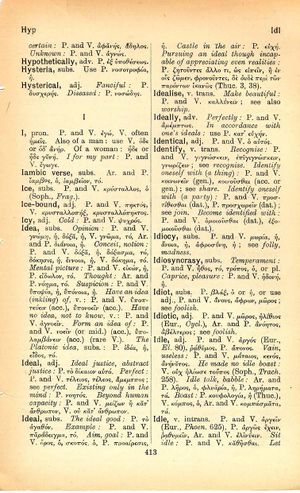idea
Ῥᾷον φέρειν δεῖ τὰς παρεστώσας τύχας → Facilius ferre oportet, quae incidunt mala → Recht leicht musst du das Schicksal tragen, das dich trifft
English > Greek (Woodhouse)
subs.
Opinion: P. and V. γνώμη, ἡ, δόξα, ἡ, V. γνῶμα, τό, Ar. and P. διάνοια, ἡ. Conceit, notion: P. and V. δόξα, ἡ, δόξασμα, τό, δόκησις, ἡ, ἔννοια, ἡ, V. δόκημα, τό. Mental picture: P. and V. εἰκών, ἡ, P. εἴδωλον, τό. Thought: Ar. and P. νόημα, τό. Suspicion: P. and V. ὑποψία, ἡ, ὑπόνοια, ἡ. Have an idea (inkling) of v.: P. and V. ὑποπτεύειν (acc.), ὑπονοεῖν (acc.). Have no idea, not to know, v.: P. and V. ἀγνοεῖν. Form an idea of: P. and V. νοεῖν (or mid.) (acc.), ὑπολαμβάνειν (acc.) (rare V.). The Platonic idea, subs.: P. ἰδέα, ἡ, εἶδος, τό.
Latin > English (Lewis & Short)
ĭdĕa: ae, f., = ιδέα,
I a (Platonic) idea, archetype, Sen. Ep. 58 med. (in Cic. Or. 3, 10; id. Ac. 1, 8, 30; id. Tusc. 1, 24, 58, as Greek).
Latin > French (Gaffiot 2016)
ĭdĕa,¹³ æ, f., idée [de Platon, type des choses : Sen. Ep. 58, 18 ; [Cicéron garde le mot grec ἰδέα : Cic. Ac. 1, 20 ; Tusc. 1, 58 ].

